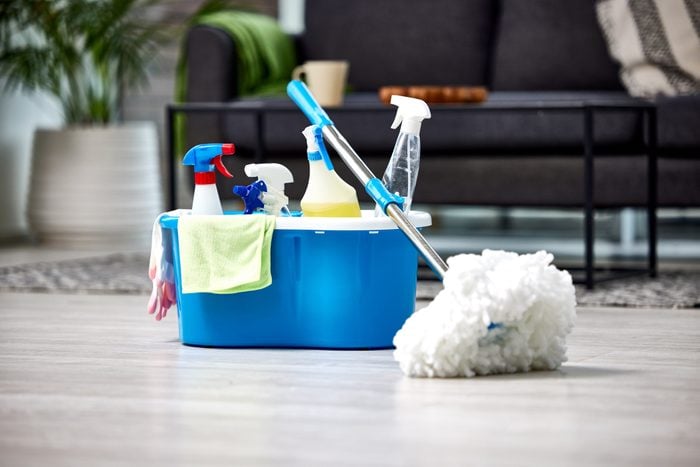
The dos and don’ts of cleaning etiquette
Housekeepers are like lawyers. They see you at your worst—yes, mostly your home, but you too—and keep their lips sealed. With a cleaning confidante like that, it’s only natural to want to do little things to show your appreciation, like saving them articles about organizing tricks or professional cleaning tips, asking about their lives or even helping them clean. But despite your good intentions, these kind gestures can sometimes miss the mark.
The house cleaners we spoke with revealed tales of extra (dirty) work they were “trusted with” but didn’t want to do, “helpful” cleaning tips that weren’t actually helpful and little etiquette mistakes that simply sucked time from what you hired them to do: clean your house. To be fair, there aren’t any hard-and-fast etiquette rules on this topic. That’s why we asked cleaning experts to give us the inside scoop on some of the thoughtful things people do that drive them crazy—and what to do instead.
Get Reader’s Digest’s Read Up newsletter for more etiquette tips, cleaning, travel, tech, humor and fun facts all week long.
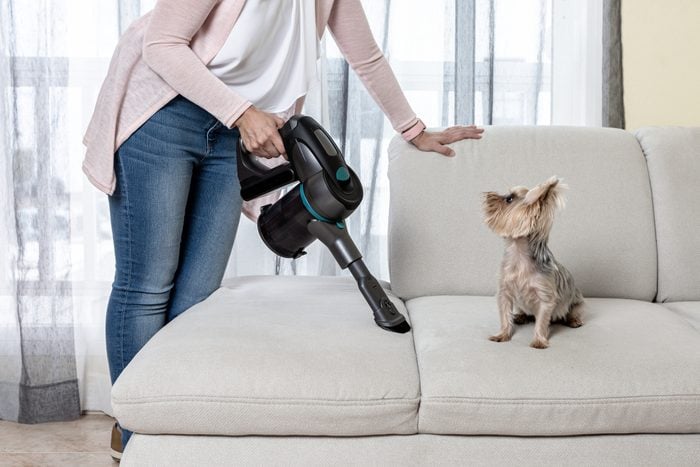
Cleaning before they arrive
You may truly believe you’re helping by cleaning before your housekeeper arrives, and maybe you are. It depends on what you mean by cleaning. If you’re quickly passing a mop over a grimy kitchen floor or wiping your granite countertops with a wet sponge and not drying them, cleaning pros say, “Thanks, but no thanks.” With the grime now further embedded into the floor or streaks on the countertops, it could actually take them more time to fix your mistake. And at the very least, they’ll have to duplicate your work anyway.
Do this instead: Focus on the clutter. “Taking things off the counters and clearing the floors can help us work much faster, and that means a better cleaning for the same amount of money,” says Gretchen Boyd, president of NYC Housecleaners. “Clear the clutter for a better clean, but leave the scrubbing to us!”
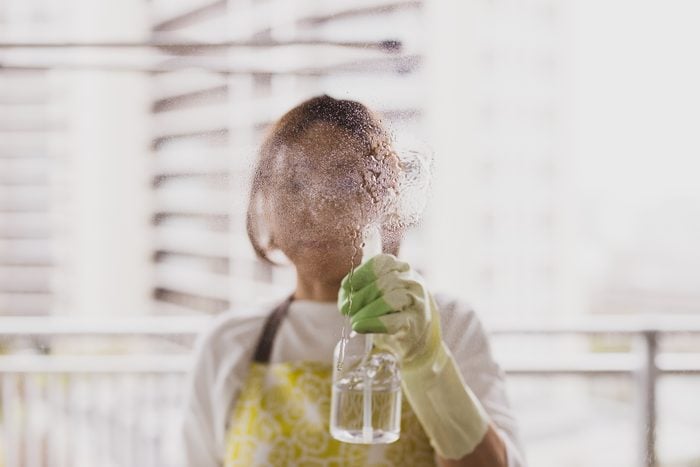
Talking to them while they’re cleaning
After a while, your housekeeper becomes more like a friend. You ask them about their lives and their families, and they certainly know all about yours. It would be rude not to talk to them while they’re there. Plus, they’re doing all the tasks you don’t want to do, so the least you could do is make things less boring with a little chitchat, right? Nope! In fact, that “entertaining” chitchat can really mess with their cleaning schedule.
“Once, a client wanted to discuss a personal issue with me while I was cleaning their home. I was happy to listen, but it extended my cleaning time by about 15 to 20 minutes,” says Laura Avila of Cleaning Fan. “I enjoy getting to know my clients, but it’s important to keep in mind that my priority is to provide them with a clean space, and conversations can sometimes hinder that goal.”
Do this instead: Spend a few minutes chatting when your housekeeper arrives, then let them get to work. “What I really appreciate is when clients give me some space to work in silence or maybe put on some music that we can both enjoy without having to chat the whole time,” says Avila. “That way, I can focus on doing a great job and getting everything cleaned up efficiently.”
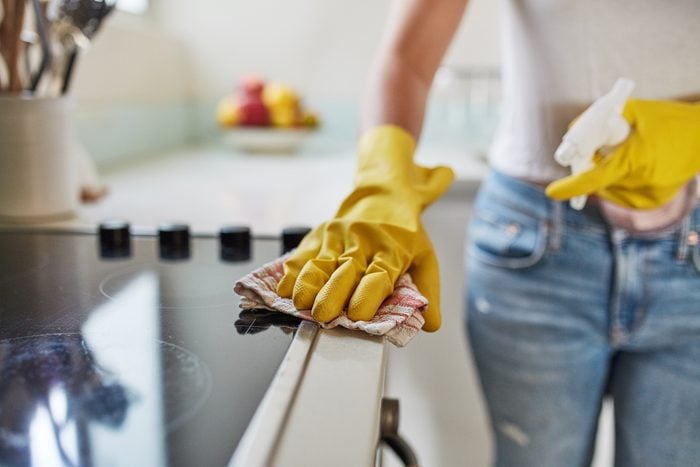
Following them around while they work
You’re not hovering; you’re keeping them company. Nope, sorry—you’re hovering. Even if you think you’re being polite by showing an interest in their work or keeping them company, this polite gesture rarely comes across as you’re hoping. Instead, house cleaners say that having someone watching them while they scrub and scour the shower gives the impression that the client doubts if their cleaner even knows how to clean the bathroom at all. And having someone watching your every move can be distracting and unnerving.
Do this instead: “I prefer when clients let me work on my own,” says Avila. If you have specific requests or concerns, talk them over when your housekeeper first arrives. Checking on progress or asking questions is fine, but minimize those types of interactions. That way, they can focus on doing the amazing job that you want them to do.

Offering agency workers extra pay for extra work
Who wouldn’t like to make some extra cash easily? Customers who go through an agency may think they are helping their house cleaner by offering extra payment for work that isn’t in the contract. What they don’t realize is that this may actually be against company policy, and their house cleaner could get in trouble. Beyond that, because professional cleaners allocate a set amount of time for each job, doing that additional chore could cause them to run late to their other clients’ homes, says Rachel Rios, a cleaning professional with Canada-based Guelph Maids. All this also puts the cleaner in the awkward position of having to say no and disappoint the client.
Do this instead: Talk to the agency ahead of time if you have a special request. Agree upon any additional charges it may incur, as well as when the cleaning will take place.
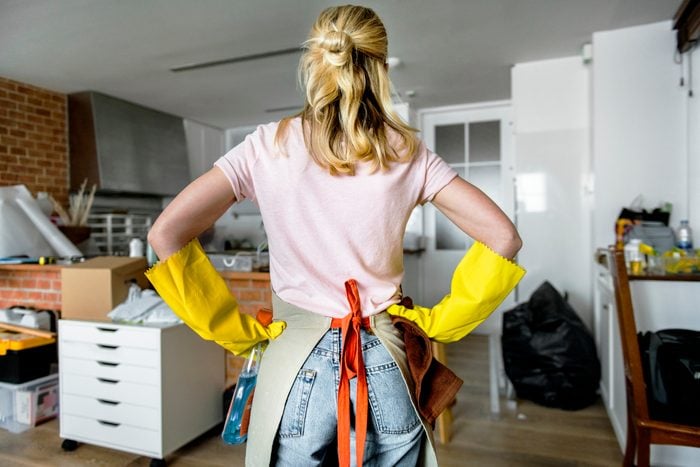
Giving vague instructions
Sometimes, clients feel like giving too many instructions will insult the cleaning pro—after all, this is their job. Or they figure the cleaner knows to include tasks like cleaning ceiling fans and windows in their weekly routine, so they casually say something like: “Clean the living room.” The problem? Without specific instructions on which areas of the house to clean, which surfaces to focus on or what kind of cleaning products to use, a house cleaner is not sure what exactly needs to be done.
There may also be confusion about whether “cleaning” entails a thorough wipe-down or a deep-clean. “Each client has different preferences and expectations,” says Hugo Guerrero, a certified house cleaning technician from New York and a consultant at Mattressive, “so it’s important to communicate clearly.”
Do this instead: Provide a list with specific details about how each task should be completed. “Be specific,” says Guerrero. “That way, there are fewer misunderstandings and more satisfactory cleaning jobs.”
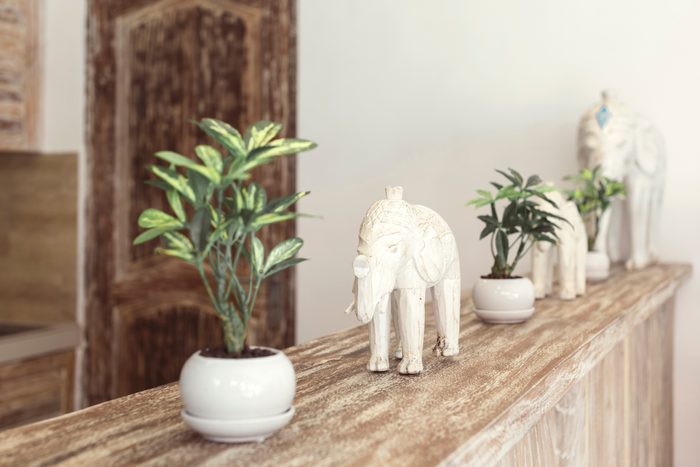
Moving items before they arrive
You might think you’re helping your house cleaner by moving sculptures, photographs, vases and other home accessories off tabletops and shelves. But this ends up creating more work for them, as well as confusion. After all, now they don’t know where these items belong—and where they should put them once they’re clean. They might also knock them over if you put them in a strange spot or accidentally break them while moving them back in place.
Do this instead: Leave everything in its original position, and let the cleaners move the items themselves. “Doing so makes it easier for the cleaner, who is used to cleaning a certain way,” says Ahmad Jamal, a cleaning expert with Cleaners Advisor. “When clients move items around, I may need to move things back to their original place in order to clean properly.” Plus, those decorative items need to be dusted and cleaned as well, and there’s a specific way to do that. If you need anything in particular moved, let your cleaner know in advance.
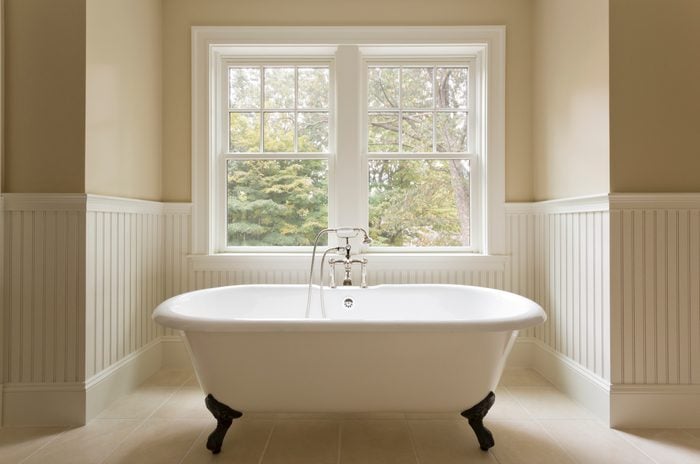
Pre-soaking the shower or tub with bleach
Clients who don’t really know how to clean a bathtub the right way may think it’s helpful to pre-soak the shower or bathtub with bleach, but this can actually be incredibly dangerous for your house cleaner. If the area is not rinsed thoroughly, it could result in a chemical reaction with the cleaning supplies the cleaning pro is using in your bathroom. For example, when bleach mixes with ammonia, it produces an odorless, toxic gas that can cause respiratory distress and even death.
Do this instead: “If you do decide to do any pre-cleaning before your house cleaner arrives, communicate which chemicals you used and where,” says Toby Schulz, CEO of Maid2Match in Australia. “And please remember to make sure the room is well ventilated.”
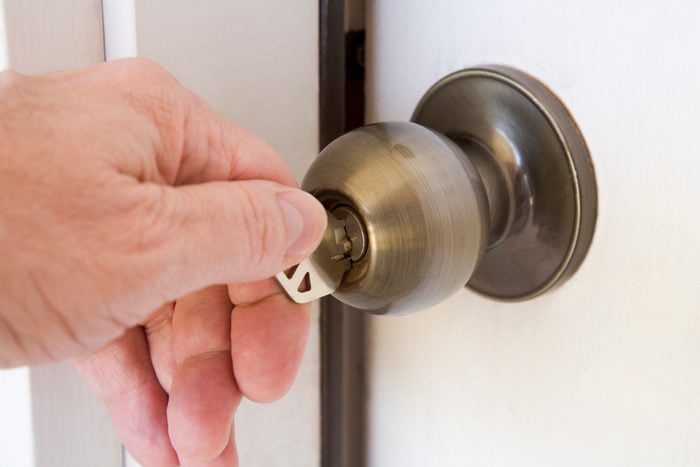
Leaving a key with a neighbor
Sometimes scheduling conflicts arise, and you need to arrange for your house cleaner to get a key to your home. Of course, you don’t want to cancel at the last minute and totally upend your cleaning pro’s schedule, and this is a good solution. Well, it is when it goes off without a hitch … which rarely happens. What if the neighbor isn’t home or doesn’t hear the doorbell?
“This never seems to quite work as planned,” says Olive Cantor of Centennial Supermaids in Colorado. “Plus, the entire cleaning job runs late, and that can impact not only our client’s cleaning but also our entire day.” Any kind gesture that inadvertently upends a person’s schedule definitely ranks high among polite habits most people secretly dislike.
Do this instead: Work out a mutually agreeable option, like bringing your key to your house cleaner earlier in the day or hiding it away in an uncommon place like under a driveway paver. If you’re looking for a more permanent solution, you might want to invest in a smart lock that lets you provide an employee with “digital keys” that work just for that day.
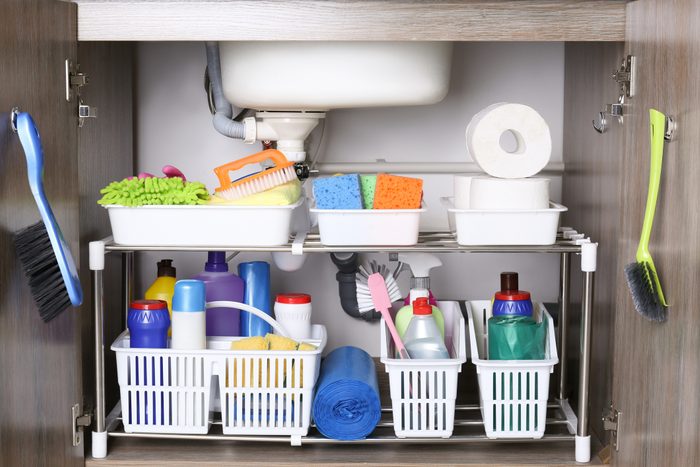
Providing your own cleaning products and tools
It’s a nice gesture to want to provide everything your house cleaner needs so it’s all right there waiting for them and they don’t have to lug it to your house every week. But insisting on the wrong tools and products can actually make the job harder, especially when you leave out all those items to “help.”
“This [makes] it hard to find my way around and determine the right way to clean each surface,” says Jenna Shaughnessy, a former professional house cleaner who’s currently a home decor and DIY expert with Jenna Kate at Home. “While you may have excellent intentions, it might make cleaning harder and take more time.”
Do this instead: Communicate your preferences in advance (like, maybe you only want natural cleaning products or your kid is allergic to a certain scent), and then discuss your house cleaner’s preferences as well. They’re the pros, after all, and they know what’s good! Perhaps they find a certain vacuum to be more effective or love a product that cuts their work time in half.
You can also discuss whether they would like you to stock up on these items for them or if they would prefer to bring their own supplies. “That way,” says Avila, “I can be sure that I’m using things I’m familiar with and that I know will work well for the job.”
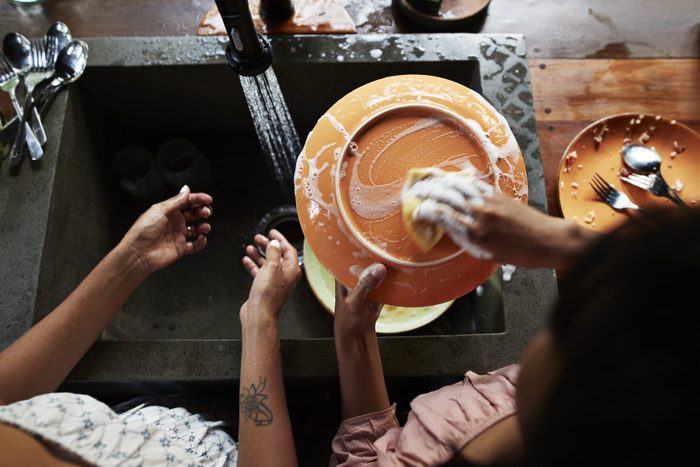
Offering “helpful advice” while they’re working
It’s your home, and it has some quirks. To be fair, so do you. And you know your house cleaner wants to do the job to your specifications, so if you happen to be in the same room and notice they could be doing something differently, you might want to offer your two cents, whether it’s about the best way to clean that tricky oven rack or how to scrub the stainless steel sink. But truly, resist the urge.
Lauren Doss, owner of Nashville Maids, notes that all the stopping, starting and direction-giving makes it difficult to work efficiently. With one client who wanted things done a very specific way and kept interjecting as she worked, Doss says it “added a lot of time to the job, as I had to double-check each step with them.” Not to mention that this behavior shows a lack of trust, even if you aren’t quite as intrusive as that client was.
Do this instead: Provide clear instructions to your cleaner before they start working, then let them do their job. “It’s important for clients to trust their housekeeping professionals and allow them to work without interference,” says Doss. “If there’s a problem, offer constructive criticism rather than nitpicking.”
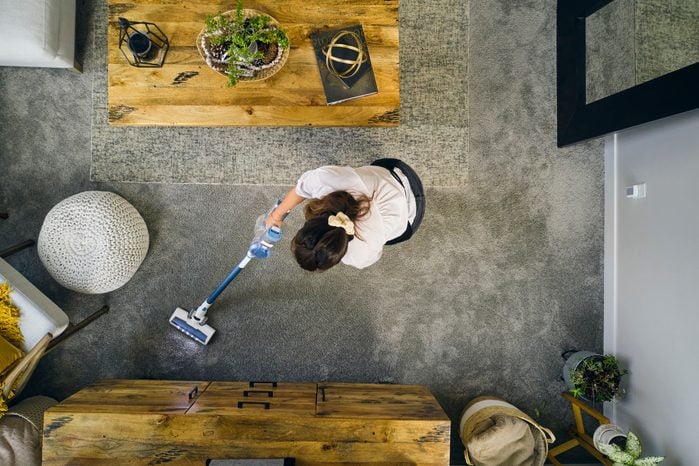
Not wanting to burden your house cleaner with other home problems
House cleaners don’t need to know tiny details about every maintenance issue in your house. Too much information! However, let’s be clear: They sure appreciate your telling them about problems that affect their job. A burned-out bulb in the fridge is not important … but a clogged toilet definitely is.
And that’s not the only potential issue here. “I had one client who failed to tell me that the door on their second oven was loose,” recounts Cantor. “I went to open the oven to clean it, and off came the door! Not only was that scary—and potentially dangerous—but I was then worried that I was the one who broke it.”
Do this instead: Let your house cleaner know if something they are going to be cleaning or using is broken. If you won’t be home when your house cleaner arrives, leave sticky notes on problem places. In the case of the broken oven door, Cantor says, “a little heads-up would have saved a lot of stress for everyone!”
Sources:
- Gretchen Boyd, president of NYC Housecleaners
- Laura Avila, Cleaning Fan
- Rachel Rios, a cleaning professional with Canada-based Guelph Maids
- Hugo Guerrero, a certified house cleaning technician from New York and a consultant at Mattressive
- Ahmad Jamal, a cleaning expert with Cleaners Advisor
- Toby Schulz, CEO of Maid2Match in Australia
- Olive Cantor, Centennial Supermaids in Colorado
- Jenna Shaughnessy, former professional house cleaner and current home decor and DIY expert at Jenna Kate at Home
- Lauren Doss, owner of Nashville Maids
